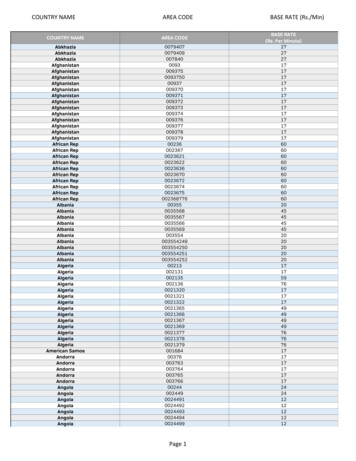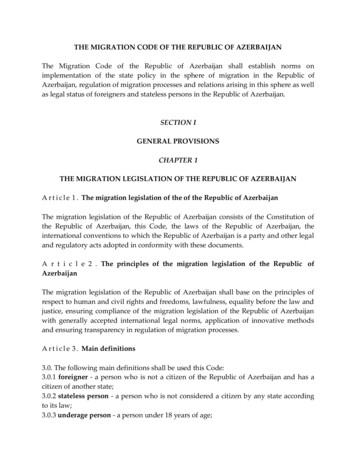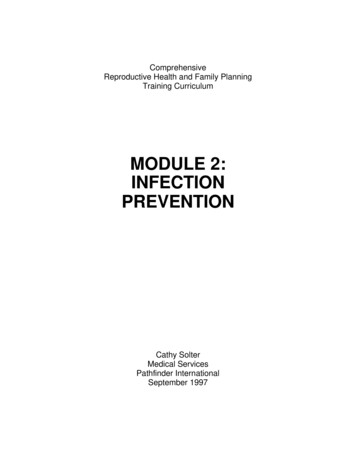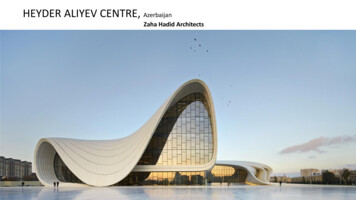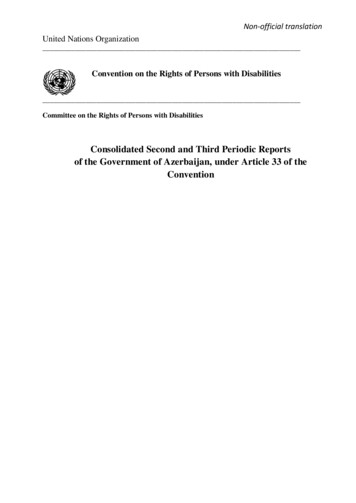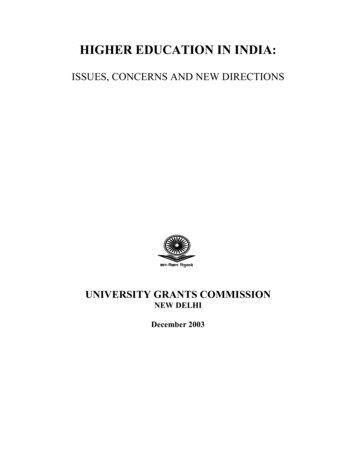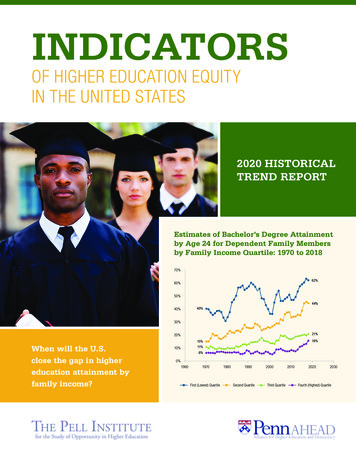
Transcription
HIGHER EDUCATION INAZERBAIJANI. Overall descriptionII. Current challenges and needs– Trends and challenges– The Bologna ProcessIII. Participation in EU programmes– Tempus– Erasmus MundusIV. Bibliographical references and websites
The higher education system in AzerbaijanSource: "Focus on Higher Education in Europe 2010 - The impact of the Bologna Process" (Eurydice, 2010).
I. Overall descriptionTypes of tertiary educationprogrammes and qualifications1. Major characteristics oftertiary education in thecountryThe new Law "On Education" adopted in June2009 introduced a three-cycle higher educationsystem. Since then the higher educationsystem of Azerbaijan is comprised of thefollowing levels:Legislation covering the field oftertiary educationThe principle goal of the system of highereducation in Azerbaijan is to educate and trainhighly-skilled specialists, as well as scientificand pedagogic staff in line with the demands ofthe community and labour market. The systemis regulated by the Constitution of the Republicof Azerbaijan, the Law on Education, othernormative and legal acts on education, as wellas international agreements co-signed by theRepublic of Azerbaijan. In 1993, the highereducation system became a two-tier highereducation system consisting of undergraduateeducation (bakalavr təhsil pilləsi) and postgraduate education (magistr təhsil pilləsi).Since then, significant reforms have beencarried out in the higher education system, asthe existing regulations were improved and acredit system was adopted by the highereducation institutions. After the first Bachelordegree alumni graduated in 1997, a total of 32higher education institutions (both public andprivate)startedprovidingpost-graduateeducation in the second tier of highereducation.1) Undergraduate (with the exception ofmedical studies) - bakalavriat;2) Post-graduate (with the exception ofmedical studies) –magistratura;3) Doctorate (doktorantura)Undergraduate courses generally take fouryears (five years for part-time programs) andcover a wide range of domains. Their contentand organizational standards are defined bythe relevant executive body. Undergraduatecourses provide students with the possibility ofemployment in certain specialized jobs aftergraduation. Upon completion of undergraduatecourses, students are awarded the academictitle “bakalavr” (Bachelor degree), within aspecific field, and they can work in variousfields except in scientific and pedagogical areasat scientific research institutes and highereducation institutions.Post-graduate courses typically last for 2 years(two and a half years for part-time programs),provide students with training in a certain fieldof study from scientific research or professionalviewpoints and enable them to engage inprofessional activity, scientific research andpedagogical activity. Upon completion ofgraduate courses, students are awarded theacademic title “magistr” (Master degree). Thecontent and organizational standards, as wellas the requirements for awarding a Masterdegree are defined by the relevant executivebody.In order to advance quality and ensure equityin education by providing fair and validentranceexaminationsandcentralisedstudents admission for higher educationinstitutions, the State Commission for issiyası - TQDK) was set up in 1992. TheSSAC developed an open system whichintegratesthefollowingmainstages:development of examination content, receptionof applications, exam administration, creationof databases and information processing. Since2005, the State Commission has beenresponsible for the enrolment of students topost-graduate courses. Although in the 1990ssome considerable attempts to carry outreforms in the higher education system ofAzerbaijan were made, the lack of relevantmechanisms hindered the implementation ofthese reforms systematically. The situationchanged only after approval of the ReformsProgram for Education of the Republic ofAzerbaijan in 1999. Within the framework ofthis Program the higher education systemunderwentstructuralmodifications,thenetwork system of higher education institutionswas improved and the institutions weregranted autonomy.Medical education includes basic educationcourses and post-graduate studies based oneducation programs and state educationstandards. Upon completion of medicaleducation the graduates are awarded theacademic title of doctor.Doctoral education is the highest level of thehigher education system and is carried out athigher education institutions and izations (the equivalent department . Upon completion of doctoralstudies students are awarded the academictitle of Doctor of Philosophy –Ph.D. (Fəlsəfəelmləri doktoru) or Doctor of Science – D.Sc.2
(Elmlər doktoru) specifying the relevant field ofstudy. Scientific degrees are awarded uponapplication by the Thesis Board (DissertasiyaŞurası) of higher education institutions andscientific organizations in accordance with thelegislation.certain proposals on the development of thebudget and funds for the development ofeducation, and defines state standards foreducation funding, as well as regulations forscholarship and salary payment.The Ministry of Education is the centralexecutive body governing the educationsystem of the country. It participates in thedevelopment and implementation of the statepolicy for education.In 2009 the Cabinet of Ministers of theRepublic of Azerbaijan approved the s): Education; Humanities and Social Sciences; Culture and Art; Economy and Management; Natural Sciences; Technological Sciences; Agricultural Sciences; Healthcare, Welfare and Services.3. Governing bodies of theHigher Education InstitutionsResponsibilities in higher education institutionsof Azerbaijan are distributed among thefollowing bodies: Scientific Board; Rector; Vice-rector;Types of tertiary educationinstitutions Board of Faculties; Deans;The system of higher education institutionsincludes mainly universities (universitet),academies (akademiya), institutes (institut). Heads of departmentsPublic higher education institutions are led by arector appointed by the President of theRepublic of Azerbaijan. The "Scientific" Board(Elmi Şura) is the senior governing body of apublic higher education institution. The rules ofestablishment and responsibilities of theScientific Board are defined in the statutesapproved by the Cabinet of Ministers and in theinternal regulations of the higher educationinstitutions concerned.There are 53 higher education institutions inAzerbaijan. 37 of these institutions are public(dövlət ali təhsil müəssisəsi), while theother 16 are private (özəl ali təhsil müəssisəsi)institutions.Some 141.697 students study ateducation institutions in Azerbaijan.higherPrivate higher education institutions are led bya rector appointed by the Board of Founders(Təsisçilər Şurası) the members of which mayinclude the founders, trustees, etc. of theinstitution.In Azerbaijan, vocational education is part ofpost-secondaryeducation.Vocationaleducation is provided by vocational schools andculminates in the receipt of a professionaldiploma. College type institutions provideeducation leading to a Pre-Bachelor diploma(subbakalavr).The Vice-rector, faculty deans and heads ofdepartments also participate in the governanceof the higher education institutions.2. Distribution ofresponsibilitiesWith the exception of the bodies responsiblefor education management, other public orprivate organisations are excluded fromintervening in issues related to the governanceof any higher education institution.Higher education is governed by the Cabinet ofMinisters of the Republic of Azerbaijan(Azərbaycan Respublikası Nazirlər Kabineti)and the Ministry of Education of the Republic ofAzerbaijan (Azərbaycan Respublikası TəhsilNazirliyi).4. FinancingPublic higher education institutions arefinanced by the Cabinet of Ministers applyingstate budgetary resources.The Cabinet of Ministers decides the educationstrategy, supervises implementation of the Lawon Education and the relevant legislative actsand documents, as well as defines theregulations for the establishment, restructuringand liquidation of higher education institutions.Moreover, the Cabinet of Ministers establishes,restructures and closes vocational institutions,as well as approves the list of qualifications,education regulations and rules. It also makesThe state budget is the basis for financingpublic higher education institutions. However,there are a number of other resources whichcan be used for financing: tuition fees;3
scientific grants allocated by thegovernment on a competitive basis;private and municipal education institutionsfounded by legal or physical entity of theRepublic of Azerbaijan is issued by the Ministryof Education and is valid for five years. Thevalidity of the temporary licence granted tonon-residents and stateless persons forestablishment of education institutions isthree years. special-purpose program and\or projectresources financed by the government; legal revenues obtained as a result of saleof outdated property (vehicles,equipment, etc) belonging to a highereducation institution;The licence granted to a foreign legal entity, itsbranches and representations, as well as tonon-residentsandstatelesspersonsisrecognized by the Government of Azerbaijanaccording to bilateral agreements co-signed bythe Republic of Azerbaijan. international grants and financialresources; grants, allowances and financialassistance legally provided by legal and\orphysical entities, non-residents and\orstateless persons, foreign legal entities,etc.Quality assurance and accreditation of highereducation institutions and programmes areimplemented by the Accreditation Commission(Akkreditasiya Komissiyası) under the Ministryof Education. The Commission may becomprised of the Minister of Education (theChairmanoftheCommission),DeputyMinisters of Education, directors and experts ofthe relevant department, Director of theInstitute of Education (Təhsil Problemləriİnstitutu), as well the representatives of therelevantministriesandorganisationscooperating with higher education institutions.Subsidisation of private higher educationinstitutions is primarily tuition-based. Suchinstitutions are also financed by resourcesprovided by their trustees (founders), variousgrants, credits, allowances, etc.5. Students' contributions andfinancial supportHigher education institutions offer mmes may include both full andpart-time courses. Students who enrol onfee-paying programmes have to pay therelevant tuition fee, the amount of which isdetermined by the higher education institutionsthemselves.Higher education institutions are accredited soas to ensure the quality of education.Accreditation attests the compliance of theeducational process, materials and technicalbases of education institutions, educationprogrammes, financial resources and ds and legal requirements.Although students are not directly providedwith full financial support, the governmentoffers certain scholarships including individualscholarships, so as to stimulate educationaldevelopment. Moreover, students with highentrance scores are granted a Presidentialscholarship. All students are provided with freesocio-psychological, methodological, medicaland informational assistance services at highereducation institutions.As regards the programmes, the Ministry ofEducation defines the accreditation andattestation requirements and criteria inaccordance with the state education standardsand a certificate valid for five years is issuedupon accreditation.7. AdmissionThe current legislation does not include directfinancial assistance to the families (parents) ofstudents. However, students belonging to IDP(Internally Displaced Persons, the population ofAzerbaijan which was driven out of their nativelands in Karabakh by Armenian armed forces)and\or martyr’s families are exempt fromtuition fees if they enrol on fee-paying courses.All those who have obtained a SecondaryEducation Certificate have the right to apply foradmission to higher education institutions.No privileges are given to students foradmission to higher education institutions (withthe exception of the winners of internationalOlympiads and other such high-level contests).6. Licensing, quality assuranceand accreditation of institutionsand/or programmesGraduates of secondary and\or vocationalschools or colleges who have been awardedthe relevant diploma of completion (orCertificate of Secondary Education - Orta TəhsilHaqqında Şəhadətnamə) may apply foradmissiontouniversities(forBachelorstudies). Admission is carried out on the basisof central examinations set by the StateStudent Admission Commission of the Republicof Azerbaijan (Tələbə Qəbulu üzrə DövlətAccording to the legislation, each educationinstitution has to obtain from the relevantexecutive authority an appropriate licence tocarry out their educational activities. Publichigher education institutions are provided witha permanent licence by the Cabinet ofMinisters, while the licence granted to certain4
Komissiyası - TQDK). Students applying forprogrammes requiring special talents (such assports, arts, etc.) have to take an additionalexamination in those relevant areas. humanities (15-20%); core subjects (80-85%)Academic programs for post-graduate studiesare divided between taught modules andscientific–research. 45-50% of contact-hoursare spent on disciplines falling under taughtmodules which includes both Humanities (2025%) and Core subjects (75-80%) The other50-55% falls under scientific-research.Upon completion of undergraduate studies,students may apply for admission topost-graduate studies. Examinations are set bythe abovementioned Commission. Furtherstudies to which a student applies shouldcorrespond to his/her educational backgroundat Bachelor level.Contact-hours for optional subjects account for25-30% of the total contact-hours within bothunder-graduate and post-graduate academicprograms. Consequently, compulsory subjectsconsist of the remaining 70-75% of the totalcontact-hours of the programs.The admission plan is drawn up by the MinistryofEducation.However,therelevantprocedures and requirements for admission aredeveloped by the State Student AdmissionCommission. This Commission also sets out theadmission procedures and structure, andimplements the admission of Azerbaijanistudents to the different levels of highereducation based on their results at thecentralized entrance exams. It also makes adecision on the admission regulations and rulesforentranceexaminations,monitorsapplication procedures, submits regular reportson admission to the President of the Republicof Azerbaijan, carries out and issues statisticaldata on the admission results, etc.10. Assessment, progression,certification and degreeIn Azerbaijan, undergraduate and postgraduate students are assessed by separatesystems and mechanisms.A multi-score system is used for assessing theeducationalprogressofundergraduatestudents. The maximum score within thissystem is 100 points for each discipline, 50points of which are accumulated during thesemester and the other 50 points during theexamination session.8. Organisation of the academicyearThe Ministry of Education is responsible fordetermining the length/beginning/end andorganisation of the academic year.The points accumulated within the multi-scoresystem indicate the followings: less than 51 points – unsatisfactory;The academic year usually begins onSeptember 15 and ends in early July. Itincludes two semesters (autumn and spring).Moreover, summer sessions (not exceedingsix weeks) may be offered to students. Theduration of the academic year is 40 weeks,each semester being 20 weeks. Examinationsessions last for five weeks, while vacationsare between 8-12 weeks (the duration ofwinter vacations should not be less than twoweeks). An academic hour at higher educationinstitutions is 45 minutes long and each lessonconsists of 90 minutes (two academic hours). 51-60 points – fair; 61-70 points – satisfactory; 71-80 points - good; 81-90 points – very good; 91-100 points – excellentPost-graduate students are assessed accordingto a 5-score system, i.e. unsatisfactory, fair,good, very good, excellent. Graduates ofhigher education institutions may apply tofurther (additional) studies if the field of studycorresponds to their prior qualification orcurrent work area. The criteria for judging theadequacy of the applicant to the studies aredefinedbytheCommission(MüsabiqəKomissiyası) set up at the higher educationinstitution concerned.9. Curriculum contentThe curriculum in Azerbaijan is defined atnational level.Curricula include compulsory and optionalsubjects. Optional subjects are defined by thehigher education institutions concerned. gies and techniques. There are alsoanumberofinternationalcurriculaimplemented upon the approval of the Ministryof Education.Undergraduate students have to sit final stateexams or defend a thesis in order to beawarded a Bachelor degree and a final grade.Upon completion of undergraduate courses andby the decision of the State AttestationCommission, students are awarded a Bachelordegree which enables them to apply for aMaster degree programme.Academic programs of Bachelor studies includethe following disciplinary categories:5
To be awarded a Master degree and finalgrade, post-graduate students must defend athesis. A special Board (İxtisaslaşdırılmışMüdafiə Şurası) comprised of the chairmanappointed by the Ministry of Education is setup for this purpose.is carried out by scientific research institutes(elmi-tədqiqat institutları) in cooperation withthe governance bodies in education, as well asby higher education institutions, includingscientific research institutes, scientific centres,departments, laboratories, etc.A Master degree and the relevant final gradegives a student an opportunity to accessdoctoral programs and work in any fieldrelevant to his\her profile, as well as to teachat higher education institutions.The Law on Education refers to highereducation institutions not only as educationalentities, but also as significant researchproviders. Higher education institutions takepart in the elaboration and implementation ofvarious research programs and projects.Scientific research carried out within the highereducation system includes fundamental andapplied research work and is funded by statebudgetary sources, various grants, financialsupport from different funds, such as theAzerbaijan National Scientific Foundation, USCivilian Research and Development Foundation(CRDF), INTAS (International Association forthe promotion of co-operation with scientistsfrom the New Independent States of theformer Soviet Union), etc., as well as the extrabudgetary resources of education institutions.11. Academic staffAcademic staff of higher education institutionsconsists of the following categories:a) teaching personnel (research andeducational staff), which includesprofessors, associate professors, seniorlecturers, lecturers and assistant lecturersb) tutors, methodologists, scholars,concertmasters and trainersc) academic assistants13. University-enterprisecooperationFaculty members are employed on acompetitive basis and on the basis of a fiveyear ses is carried out independently andinstitutionsthemselvesmayarrangeinternships and training for their students.However, there are no studies on the impactand quality of such arrangements.The requirements for the position as a seniorlecturer are the following: candidates for science posts - at leastthree years work experience in a scientificand educational domain;14. International cooperation highly qualified specialists with at leastfive years work experience and publishedscientific and methodological work and,The Ministry of Education closely collaborateswith major international organizations (theCouncil of Europe, UNESCO, World Bank,UNICEF, UNDP, ETF, ISESCO, EU), as well aswithinternationalnongovernmentalorganizations (Education Law and Policy, OpenSocietyInstitute,American Council forCollaboration in Education and Language Study(ACCELS),InternationalResearchandExchange Board (IREX), DAAD). Cooperationincludes policy dialogue, convening jointconferences, seminars, and workshops onissues related to the implementation ofBologna process requirements, exchange ofstudents, faculty members and researchers,improvement of the content of education,participation in joint projects, etc. holders of a Master degree with at leastthree years work experience in therelevant domain.The requirements for the position of a lecturerare the following: candidates for science posts; highly qualified specialists with at leastfive years work experience and publishedscientific and methodological work and, holders of a Master degree with goodeducational progress (graduation pointsshould exceed 81 points) and at least oneyear work experience.Cooperation between Azerbaijan and the EU usMundus,Twinning\TAIEX and Sigma programs.Students successfully completing full-timepost-graduate education, as well as holders ofa Master degree with Honours may beappointed to a teacher position for a maximumof three years under assignment by therelevant institution.Policy dialogues with partners from otherregions of the world are held during visits ofMinistry officials and exchanges with officialdelegations at the Ministry of Education andhigher education institutions. During recentyears such dialogue has expanded to a number12. Research activitiesScientific research within the education system6
Neft Fondu) and aims at educating a total of5 000 Azerbaijani students abroad.of countries including the USA, Canada,France, Germany, the UK, South Korea, Egypt,Israel, etc. Protocols and agreements onmutual recognition of degrees have beensigned with the Russian Federation, Ukraine,Turkey and Austria.There are also foreign students studying inAzerbaijan within the framework of bilateralcooperation with overseas countries in the fieldof higher education. While some of the foreignstudents study in Azerbaijan in accordancewith intergovernmental agreements, most ofthem are offered fee-paying courses inaccordance with the agreements of highereducation institutions concerned. Currently,there are 6 813 foreign students in Azerbaijanfrom about 50 different countries of the world.Student mobility is regulated by internationalagreements and contracts signed betweendifferent countries. Azerbaijani students aregranted scholarships from the Government ofAzerbaijan, which gives them an opportunity tostudy at various prestigious universities of theworld. The “State Scholarship Program forEducation of Azerbaijani Youth Abroad (20072015)” is financed by the State Oil Fund (DövltII. Current challenges and needs1. Trends and challengeshigher education institutions of Azerbaijanin countries involved in the Bolognaprocess.The Ministry of Education is responsible formonitoringtheimplementationoftherequirements of the Bologna Declaration inAzerbaijan.Althoughsomeconsiderableachievements were made within the frameworkof this process, there are still a number ofchallenges and needs in the implementation.These challenges could be summarized asfollows:- Recognition of the quality assurancemechanism of the Republic of Azerbaijanshould be ensured in the countriesinvolved in the Bologna Process.- A database should be created to allow theAzerbaijani experts take part in theinternational commissions on qualityassurance in education.- Activities on the elaboration of trainingand methodological literature, exemplarycurriculum and textbooks in conformitywith the standards of national educationshould be expanded; necessary measuresshould be taken to allocate finances forthis purpose.- The present legislation for ensuring theacademic mobility of academic staff andstudents should be improved and newlegislative acts should be developed.- Democratic principles should be applied inthe governance of higher educationinstitutions to a larger extent.- A grant system should be created forensuring the mobility of academic staffand students.- Participation of students should beensured and the role of the public shouldbe increased. The attention of the publicshould focus on the problems and needsof education. Democratic principles shouldbe widely applied to the educationprocess.At present, the main goal of the reformscarried out in the higher education system ofAzerbaijan is to adapt to the Bolognaprinciples, to guarantee its attractiveness andcompetitiveness, to satisfy the demands forqualified citizens needed for developing theeconomy and building an effective highereducation system.- All the normative documents on education(decrees, regulations, etc) should berevised, and the existing gaps should beremoved.On 22 May 2009, the President of the Republicof Azerbaijan approved the State Program onthe Reforms in the Higher Education System ofthe Republic of Azerbaijan (2009-2013). Therelevant Action Plan was approved on July 10,2009.- The process of attestation andaccreditation of higher educationinstitutions should be sped up.- Necessary measures should be taken forthe recognition of degrees conferred byThe principal goals of the reforms are:7
to improve the educational content andteaching technologies ensuring thecompatibility of higher educationqualifications with the demands of thelocal market and the Framework forQualifications of the European HigherEducation Area; Koordinasiya Şurası) was established with theaim of implementing the measures set forth inthe Action Plan.According to the principles of the BolognaDeclaration, the education progress of studentsis estimated on the basis of a multi-scoresystem. A credit system is being applied to theteaching process. All teaching programs havebeen adapted to the requirements of the creditsystem; students are provided with “tutorservices” (academic advisory services) in orderto provide them with pedagogical assistance.Summer sessions are organized for those whofailed their exams during regular sessions.to introduce new academicplans/programs, scientific andmethodological guidelines on moderntraining and information techniques; to modernize the structure andgovernance system of HEIs; to involve international experts in theaccreditation process with a view topromoting the quality of the highereducation;The Diploma supplement has been devised,approved and sent to all higher educationinstitutions. Qualifications granted in foreigncountries are recognized by the PermanentCommission (Daimi Kommissiya). to encourage close collaboration betweenhigher education and research institutes; to supply HEIs with cutting-edge facilitiesand equipment;The accreditation and licensing procedures ofhigher education institutions are implementedwith a view to establishing a quality assurancesystem. In order to ensure the quality of thehigher education system and improve itscompetitiveness, new mechanisms to definebudget support for the institutions (per capitafunding) have been introduced. to establish university campuses and elibraries; to introduce new mechanisms to definebudget support for HEIs.The Board for Scientific Coordination (Elmi2. The Bologna ProcessThe Bologna cycle structureLevel of implementation ofa three-cycle structurecompliant with theBologna ProcessExtensive but gradual introduction/ ongoing adaptations or extensionsStudent workload/duration for the most common Bologna programmesBachelor programmesBachelor/master cyclestructure models mostcommonly implemented240 ECTS (4 years)Master programmes120 ECTS (2 years)240 120 ECTS credits (4 2 academic year)European Credit Transfer System (ECTS)Legislation on ECTSLegislation governing the arrangements for implementing ECTS has beenintroduced.Level of implementation ofECTSOver 75% of institutions and programmes use ECTS for both transfer andaccumulation purposes. Allocation of ECTS is based on contact hours, or acombination of contact hours and student workload.Diploma Supplement (DS)Implementation of theDiploma SupplementDiploma SupplementissuedPartial and gradual introductionOn request and free of charge8In the language of instruction and/orEnglish
National Qualification Framework (NQF)XStage towardsestablishing a NationalQualification FrameworkNot yet started formally.Step 1: Decision taken. Process just started.Step 2: The purpose of the NQF has been agreed and the process isunder way including discussions and consultations. Various committeeshave been established.Step 3: The NQF has been adopted formally and the implementationhas started.Step 4: Redesigning the study programmes is on-going and the processis close to completion.Step 5: Overall process fully completed including self-certifiedcompatibility with the Framework for qualifications of the EuropeanHigher Education Area.National Quality Assurance SystemNational Body for Quality AssuranceNameDepartment for Accreditation under the Ministry of EducationYear of establishment2010StatusGovernment-dependent body or ministryPrincipal "object" of theInstitutions plus programmesevaluationsBody responsible forBoth public and private higher education institutionsA decision granting the reviewed institution/programme permission toXMain outcome of theoperate/teach at certain levels/undertake research, etc.reviewAdvice on how the reviewed institution/programme can improve qualityin specific areasRecognition of qualificationsRatification of the LisbonRecognition ConventionAdoption of nationallaws/regulations requiredto implement the LisbonRecognition ConventionInstitution responsi
of the higher education institutions. With the exception of the bodies responsible for education management, other public or private organisations are excluded from intervening in issues related to the governance of any higher education institution. 4. Financing Public higher education institutions are financed by the Cabinet of Ministers applying
